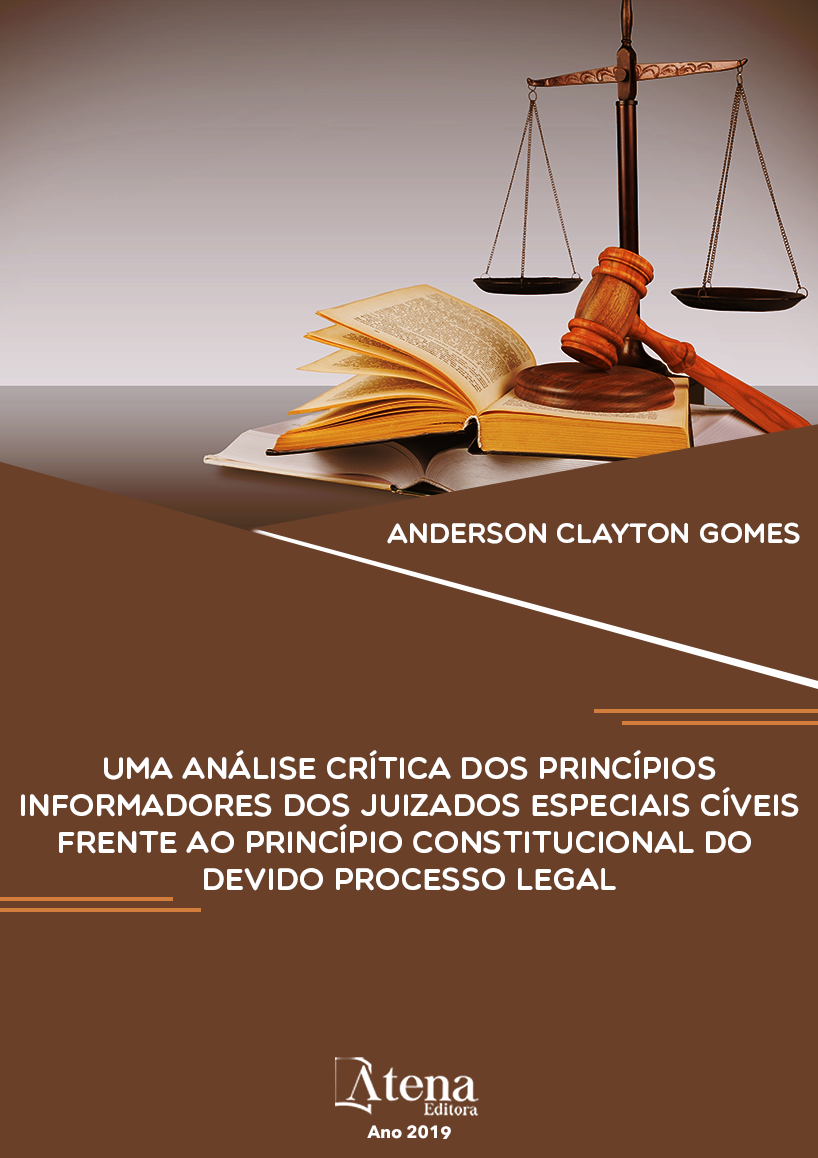
UMA ANÁLISE CRÍTICA DOS PRINCÍPIOS INFORMADORES DOS JUIZADOS ESPECIAIS CÍVEIS FRENTE AO PRINCÍPIO CONSTITUCIONAL DO DEVIDO PROCESSO LEGAL
Os Juizados Especiais Cíveis foram criados com o objetivo de ampliar o acesso à justiça do cidadão brasileiro ao Poder Judiciário, sendo orientados pelos princípios da informalidade, simplicidade, oralidade, celeridade e economia processual. A origem dessa justiça especializada no Brasil se deu através da Lei 7.244/1984, sendo inspirada nas SCC’s (Small Claim Court) dos Estados Unidos da América, em especial no Juizado de Pequenas Causas de Nova Iorque. A sociedade evolui e o direito também deve evoluir e desse modo a legislação do Juizado Especial no Brasil se expandiu e se aperfeiçoou, originando-se o Microssistema dos Juizados Especiais, formado pela Lei 9.099/1995, 10.259/2001 e 12.153/2009, ou seja, Juizados Especiais Cíveis Estaduais, Juizados Especiais Federais e Juizados Especiais da Fazenda Pública. Ocorre que a criação dos Juizados Especiais objetivando a simplicidade, celeridade, informalidade no julgamento de causas de menor complexidade e determinados valores, abdicou da presença obrigatória do advogado em determinados atos, retirou do jurisdicionado garantias processuais e, em especial no Brasil, conforme a doutrina e jurisprudência, culminou com a mitigação do devido processo legal, ou seja, a garantia de um processo judicial sem vícios, princípio esse adotado pela Constituição da República Federativa do Brasil, bem como nos demais países, onde vigora o Estado Democrático de Direito. Os princípios informadores dos Juizados Especiais Cíveis não devem se sobrepor aos princípios constitucionais do processo, notadamente, do Devido Processo Legal, mas sim, serem submissos a este. A análise crítica dos princípios informadores dos Juizados Especiais Cíveis em face dos princípios constitucionais do processo, revela que o jurisdicionado dessa justiça especializada, através das decisões e sentenças judiciais prolatadas estão sofrendo sérios danos em suas garantias constitucionais do processo, pois os juízes ao fundamentarem suas decisões pautam-se em jurisprudência do STF totalmente inconstitucional, mitigando o devido processo legal nos Juizados Especiais Cíveis prejudicando o equilíbrio das relações interpessoais no processo. Diante dessa problemática percebe-se a necessidade de uma padronização e ampliação do recurso das decisões interlocutórias disposto na legislação dos Juizados Especiais Federais e Resumo 2 dos Juizados Especiais da Fazenda Pública, para todo o Microssistema dos Juizados Especiais, podendo tal recurso ser denominado como agravo ou agravo inominado, não importa, desde que tal mecanismo possa garantir a devida aplicação do direito ao caso concreto sem quaisquer percalços processuais que impossibilitem o exercício do pleno direito pelo jurisdicionado dessa justiça especializada, porém, garantindo a celeridade e economia processual objetivos derradeiros da criação dos Juizados Especiais auxiliando no expurgo da afirmação de que a justiça decorrente dos Juizados Especiais é uma justiça de segunda classe.
UMA ANÁLISE CRÍTICA DOS PRINCÍPIOS INFORMADORES DOS JUIZADOS ESPECIAIS CÍVEIS FRENTE AO PRINCÍPIO CONSTITUCIONAL DO DEVIDO PROCESSO LEGAL
-
DOI: 10.22533/at.ed.499190611
-
Palavras-chave: 1. Devido processo legal – Brasil. 2. Direito constitucional – Brasil. 3. Juizados especiais cíveis – Brasil.
-
Keywords: Special Civil Courts. Informing Principles. Due Process Legal. Critical analysis.
-
Abstract:
The Special Civil Courts were created with the objective of increasing the access to
justice of the Brazilian citizen to the Judiciary, being guided by the principles of informality,
simplicity, orality, speed and procedural economy. The origin of this specialized justice
in Brazil was given through Law 7.244 / 1984, and was inspired by the Small Claims
Court of the United States of America, especially in the Small Claims Court of New York.
The society evolves and the law must also evolve and thus the legislation of the Special
Court in Brazil has expanded and improved, resulting in the Special Courts Microsystem,
formed by Law 9.099 / 1995, 10.259 / 2001 and 12.153 / 2009, or Special Courts State
Courts, Special Federal Courts and Special Courts of the Public Treasury. It happens that
the creation of the Special Courts aiming at simplicity, speed, informality in the judgment
of cases of less complexity and certain values, abdicated from the obligatory presence
of the lawyer in certain acts, removed from the jurisdictional procedural guarantees
and, especially in Brazil, according to the doctrine and jurisprudence, culminated in the
mitigation of due process, that is, the guarantee of a judicial process without vices, a
principle adopted by the Constitution of the Federative Republic of Brazil, as well as in
other countries where the Democratic State of Law is in force. The reporting principles of
the Special Civil Courts must not overlap with the constitutional principles of the process,
especially due to due process of law, but rather be submissive to it. The critical analysis
of the reporting principles of the Special Civil Courts in the face of the constitutional
principles of the process reveals that the jurisdiction of this specialized court, through
the decisions and sentences handed down, are suffering serious damages in their
constitutional guarantees of the process, since the judges in Decisions are based on
case law of the STF totally unconstitutional, mitigating due process in the Special Civil
Courts prejudicing the balance of interpersonal relations in the process. Faced with
this problem, it is necessary to standardize and amplify the appeal of the interlocutory
decisions provided for in the legislation of the Federal Special Courts and the Special
Courts of Public Finance for the whole of the Special Courts Microsystem, which may
be termed as an aggravation or aggravation It does not matter, provided that such a
mechanism can guarantee the proper application of the right to the specific case without
any procedural obstacles that make it impossible for the specialized court to exercise its
full right, but guaranteeing the speed and procedural economy the ultimate objectives of
the creation of the Courts Specials assisting in purging the claim that justice arising from
Special Courts is a second-class justice.
-
Número de páginas: 106
- Anderson Clayton Gomes


